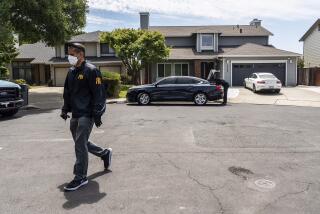Waste Firm Agrees to Open Files of Its Parent Company
- Share via
Pacific Waste Management Corp., which is seeking a permit to build a waste-to-energy plant in Irwindale, has agreed to open the files of its parent company in Canada to the project’s leading opponent, Miller Brewing Co.
The concession was made Tuesday at a hearing in Irwindale conducted by a state Energy Commission committee that is reviewing Pacific Waste’s permit application.
Attorneys for Miller Brewing Co., which owns a brewery near the quarry where Pacific Waste proposes to build a plant to burn 3,000 tons of trash a day to generate electricity, charged that Pacific Waste concealed documents about the planned plant by shipping them to its parent company, Conversion Industries Inc., in Vancouver.
Order for Pacific Waste Data
The committee issued an order in June requiring Pacific Waste to produce documents sought by Miller Brewing, including papers on air pollution and other problems that might be created by the proposed plant. Miller’s attorneys said some of the documents they sought were apparently sent to Canada to avoid the committee order.
Attorney Terry O. Kelly, representing Miller Brewing, said the integrity of the Energy Commission’s process will be undermined if the committee allows Pacific Waste to conceal documents in the files of its parent company.
“We need to find out why the applicant has gone to such lengths to keep documents away from public scrutiny,” Kelly said.
But, attorney Steven A. Broiles, representing Pacific Waste, said the company has already allowed Miller Brewer’s attorneys to examine 25,000 documents in the offices of Pacific Waste and its consultants and will also make the papers at Conversion Industries available.
“We will give them access,” he said.
Broiles said the files from Conversion Industries’ had been withheld not to conceal damaging information but to raise the issue of fairness. He said Pacific Waste has been forced to throw its files open, but it has been unable to obtain information from two project opponents, Miller Brewing and the City of Duarte.
Disqualification Sought
Attorney Richard Richards, also representing Pacific Waste, asked the Energy Commission committee to disqualify Miller Brewing and Duarte as intervenors in the case because they have not produced relevant documents. The committee took the motion under study.
Richards said Pacific Waste has a right to find out the factual basis for any criticisms about the project that are made by intervenors. That information, he said, will help the commission decide how much weight to give the criticisms.
But, Kelly argued that although Miller Brewery has voluntarily supplied most of the information requested by Pacific Waste, the motive of Pacific Waste seems to be to discourage opposition by directing burdensome data requests to opponents.
Pacific Waste asked the City of Duarte to supply detailed information about a closed landfill, the city’s waste disposal plans and environmental studies. Jesse Duff, assistant to the city manager, said supplying all of the information will be costly. In fact, it will be such a financial burden, he said, that the city will have to reevaluate whether it can afford to continue to represent its residents as an intervenor in the commission proceedings.
Richards said the committee could always disallow data requests that are too burdensome because of cost. But, he said, it is important to establish the principle that Pacific Waste has the right to relevant information from its opponents.
Confidentiality Cited
Kelly said Miller Brewing has given “literally thousands of pages of documents” to Pacific Waste. But, he said, Pacific Waste has sought additional information about the instructions given by Miller’s attorneys to the experts hired to analyze the waste-to-energy proposal and about consultants who were hired but whose information was not used. Kelly said the data requests are too broad and invade attorney-client confidentiality.
Kelly argued that the focus should remain on Pacific Waste’s application and that requiring others to provide information at this stage would be a pointless diversion.
Ernesto Perez, an attorney who is the Energy Commission’s public adviser assigned to help the public participate in commission proceedings, sided with Miller Brewing and Duarte in the argument. He said that now, during the discovery phase of the proceedings, it would discourage public participation to require those intervening to respond to data requests.
During the later evidentiary phase, those who testify about the project should be subject to cross-examination and should be required to supply information about the basis for their testimony, he said.
More to Read
Inside the business of entertainment
The Wide Shot brings you news, analysis and insights on everything from streaming wars to production — and what it all means for the future.
You may occasionally receive promotional content from the Los Angeles Times.










